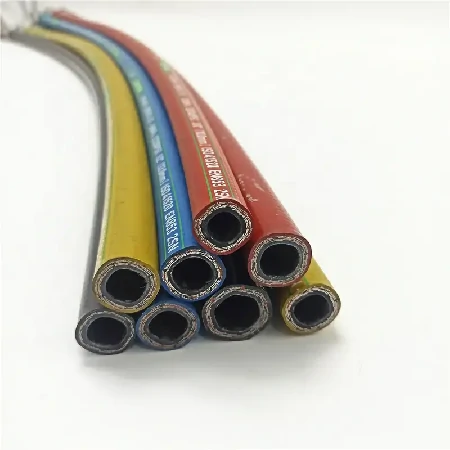8 月 . 21, 2024 03:57 Back to list
Exploring the Importance of Gasoline Hoses in Automotive Fuel Systems
The Importance of Gasoline Hoses in the Automotive Industry
Gasoline hoses play a crucial role in the automotive and petroleum industries, facilitating the safe and efficient transfer of fuel from pumps to vehicles. These hoses are specifically designed to handle the demands of gasoline and other fuel types, ensuring that they can withstand varying pressures, temperatures, and environmental conditions. Understanding the functionality, construction, and maintenance of gasoline hoses is vital for anyone involved in automotive repair, fueling operations, or even regulatory compliance.
Construction and Material
Gasoline hoses are typically constructed from materials that can resist degradation caused by the chemical composition of gasoline and other fuels. Common materials include rubber, reinforced plastic, and various composite materials that provide flexibility and durability. The inner lining of the hose is often designed to be compatible with gasoline, preventing swelling or cracking that can lead to leaks. Additionally, many gasoline hoses are reinforced with braided fibers to enhance their strength, making them capable of withstanding high pressure during the fuel transfer process.
The construction of gasoline hoses also takes into account temperature fluctuations. As fuel is pumped, it can generate heat due to friction and the conditions surrounding the hose. Therefore, hoses are often rated for specific temperature ranges to ensure optimal performance. Regular inspections are necessary to identify any wear and tear that may compromise the hose's integrity, preventing hazardous situations.
Safety Considerations
Safety is paramount when handling gasoline, given its flammable nature. Gasoline hoses are designed with specific features that enhance their safety profile. For example, many modern gasoline hoses come equipped with anti-static properties to prevent the buildup of static electricity, which can ignite fuel vapors. Additionally, some hoses incorporate safety reinforcements, such as fire-resistant materials, to minimize risks in case of an accident.
gasoline hose

Proper handling and storage of gasoline hoses also contribute significantly to safety. Hoses should be kept in cool, dry areas away from direct sunlight, as prolonged exposure to UV light can deteriorate the material. Furthermore, operators should follow stringent protocols when connecting and disconnecting hoses to avoid spills and potential hazards.
Applications
Gasoline hoses find applications beyond just conventional fueling stations. They are used in various scenarios, such as automotive repair shops, racing tracks, and even in some industrial applications where fuel transfer is necessary. Each use case may require specific types of hoses to suit the operational environment. For instance, in a racing context, lightweight and high-pressure hoses are required to allow for faster refueling while maintaining safety standards.
In addition to automotive uses, gasoline hoses can also be found in agriculture, where they facilitate the transfer of fuel to machinery and equipment. With advancements in technology, the future of gasoline hose design may encompass smart features that monitor fluid transfer and detect leaks in real-time.
Conclusion
In conclusion, gasoline hoses are an integral component in the safe and effective transfer of fuel in various industries. Their design, made from specialized materials that offer resistance to wear and environmental factors, ensures that they perform reliably under pressure. Safety considerations are paramount, given the risks associated with gasoline, and proper handling and maintenance protocols must be adhered to. As technology evolves, the role of gasoline hoses will continue to adapt, reflecting the ongoing need for safety and efficiency in fuel management. Whether in everyday automotive usage or specialized applications, understanding the significance of gasoline hoses is essential for promoting the safety and reliability of fuel transfer operations.
-
EN857 2SC Hydraulic Hose Suppliers OEM & China Manufacturers
NewsMay.30,2025
-
51mm Hydraulic Hose Manufacturer China OEM Durable & Custom Solutions
NewsMay.30,2025
-
OEM Rubber Air Hose Supplier Durable Custom Solutions
NewsMay.29,2025
-
High-Pressure Wrapped Cover Steel Wire Spiral Hydraulic Hose Supplier
NewsMay.29,2025
-
Rubber water suction and discharge hose
NewsMar.07,2025
-
SAE 100 R6/EN 854 R6 Fibre Braided Oil Hose
NewsMar.07,2025



